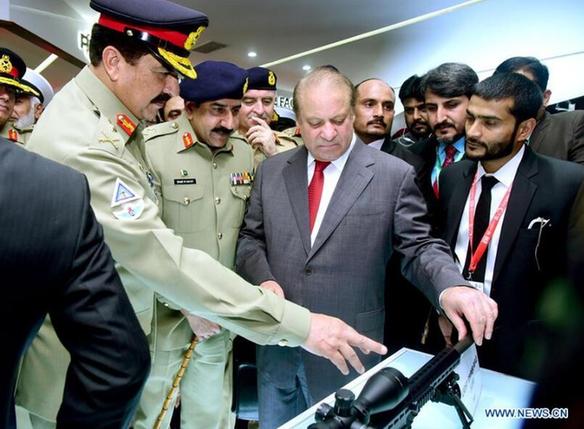Pakistan's looming political instability and China
- By Sajjad Malik
 0 Comment(s)
0 Comment(s) Print
Print E-mail China.org.cn, April 25, 2017
E-mail China.org.cn, April 25, 2017
|
|
|
Pakistani Prime Minister Nawaz Sharif (2nd, R) examines a weapon during the 9th International Defense Exhibition and Seminar 2016 (IDEAS-2016) in Pakistan's southern port city of Karachi, Nov. 22, 2016. IDEAS-2016 commenced at Karachi Expo Center on Tuesday. [Xinhua file photo] |
The judgement was in a case filed by opposition political leaders last year, asking the court to probe allegations of corruption against Mr. Sharif and his family. Pakistan has its own share of misfortune when it comes to tackling malpractice by powerful elites, accused of making money by misusing their authority.
The publication of the Panama Papers was instrumental in showing the involvement of hundreds of wealthy Pakistanis in offshore companies and assets avoiding taxes. Sharif's two sons and a daughter were mentioned as the owners of companies operating properties in a wealthy part of London.
These properties are at the heart of the controversy. Sharif's opponents allege he used authority as prime minister in the 1990s to illegally transfer money abroad to buy these assets. He has denied this, saying his late father had set up businesses in the Gulf region long before he became prime minister, and the proceeds from the sale of these ventures were used to purchase the London properties.
The Supreme Court intervened to take up the case when opposition leader Imran Khan of the Pakistan Tehreek-e-Insaf (PTI) party threatened a major protest last year against the Sharif government. Hearings were held from November 3 last year to February 23, and the judgment was delivered on April 20.
The five-member panel of judges issued a split decision: Two judges said Sharif should be disqualified as there was ample proof of financial wrongdoing; three judges said more investigation was needed to reach at a final verdict and they ordered the establishment of a new panel to complete the investigation of Sharif and his two sons within 60 days.
Sharif and his Pakistan Muslims League-Nawaz party are celebrating it as a victory; however, the opposition is still demanding his resignation on moral grounds. They argue that this is the first time two Supreme Court justices have declared Sharif not honest enough to lead the country.
Legally speaking, Sharif cannot be removed as the majority ruling is in his favor. However, the enraged opposition has called for new wave of protests from next week that could be disastrous for Pakistan.
It is just recovering from more than a decade of economic stagnation. Projections by international agencies show economic growth could touch 5.2 percent this year. Now, that progress could be derailed. The tragedy is that it is happening when hardly one year is left before the next election is due in mid-2018.
China as a strategic partner and main investor in Pakistan certainly should be worried at such developments. It has been pumping billions of dollars into the China-Pakistan Economic Corridor (CPEC) project, part of the Belt and Road Initiative and to link Western China through networks of roads and railways with the warm water port of Gwadar, located at the mouth of the Arabian Sea in southern Pakistan. The CPEC provides the shortest route for China to reach the Middle East, Africa and Europe.
The CPEC was announced when President Xi Jinping visited Pakistan in 2015. The project was supposed to have been launched in 2014, but was delayed as the opposition Pakistan Tehreek-e-Insaf was protesting in the heart of capital Islamabad. The protest at that time was for alleged fraud in elections. The issue now has changed to financial corruption, but the tactics are the same.
Mr. Sharif has alleged that the 2014 protest caused massive economic losses by delaying the start of CPEC. The damage could be more substantial now if the protests were prolonged. It could delay completion of some of the CPEC projects due for completion by 2018 under the early harvest system.
The next 60 days are crucial as the opposition wants Sharif to step aside for this period to let the probe take place without any potential government intervention. It looks unlikely as Sharif and his party assert that though they would allow and even facilitate the probe, resignation is out of question.
Hence, China might well be wise to view options as to how the potential dangerous political instability could be avoided without getting dragged into the messy local politics.
Sajjad Malik is a columnist with China.org.cn. For more information please visit:
http://www.china.org.cn/opinion/SajjadMalik.htm
Opinion articles reflect the views of their authors, not necessarily those of China.org.cn.







Go to Forum >>0 Comment(s)